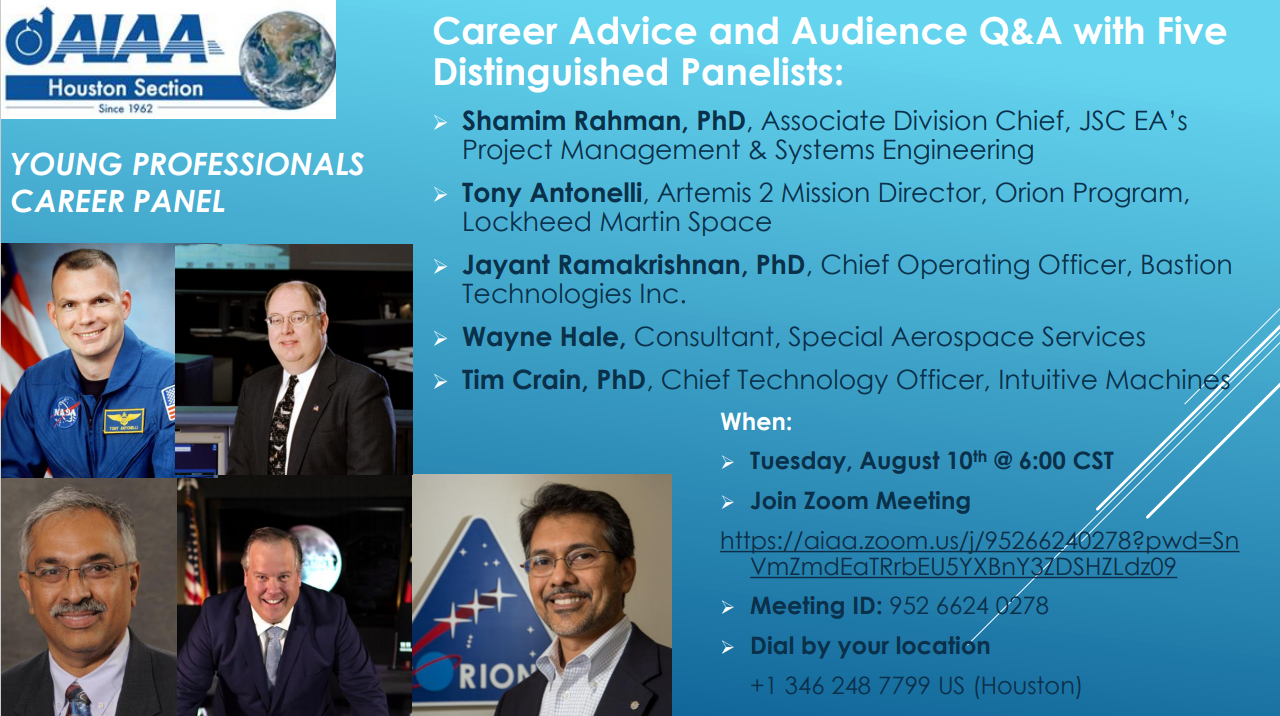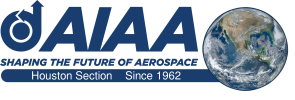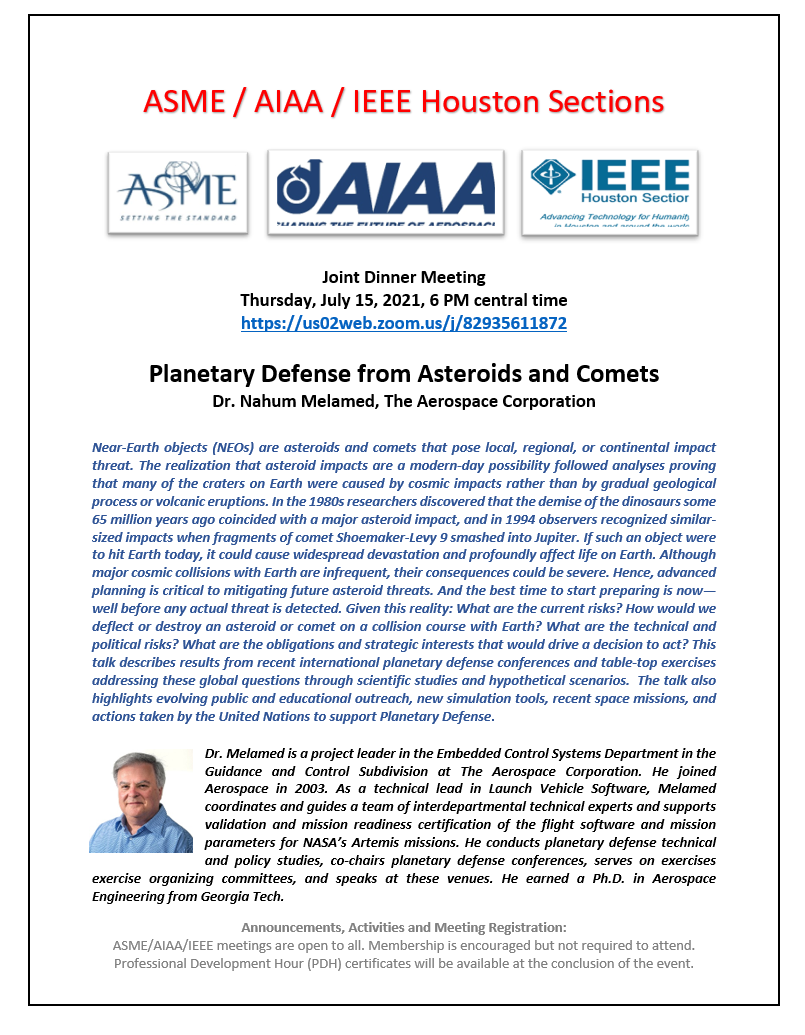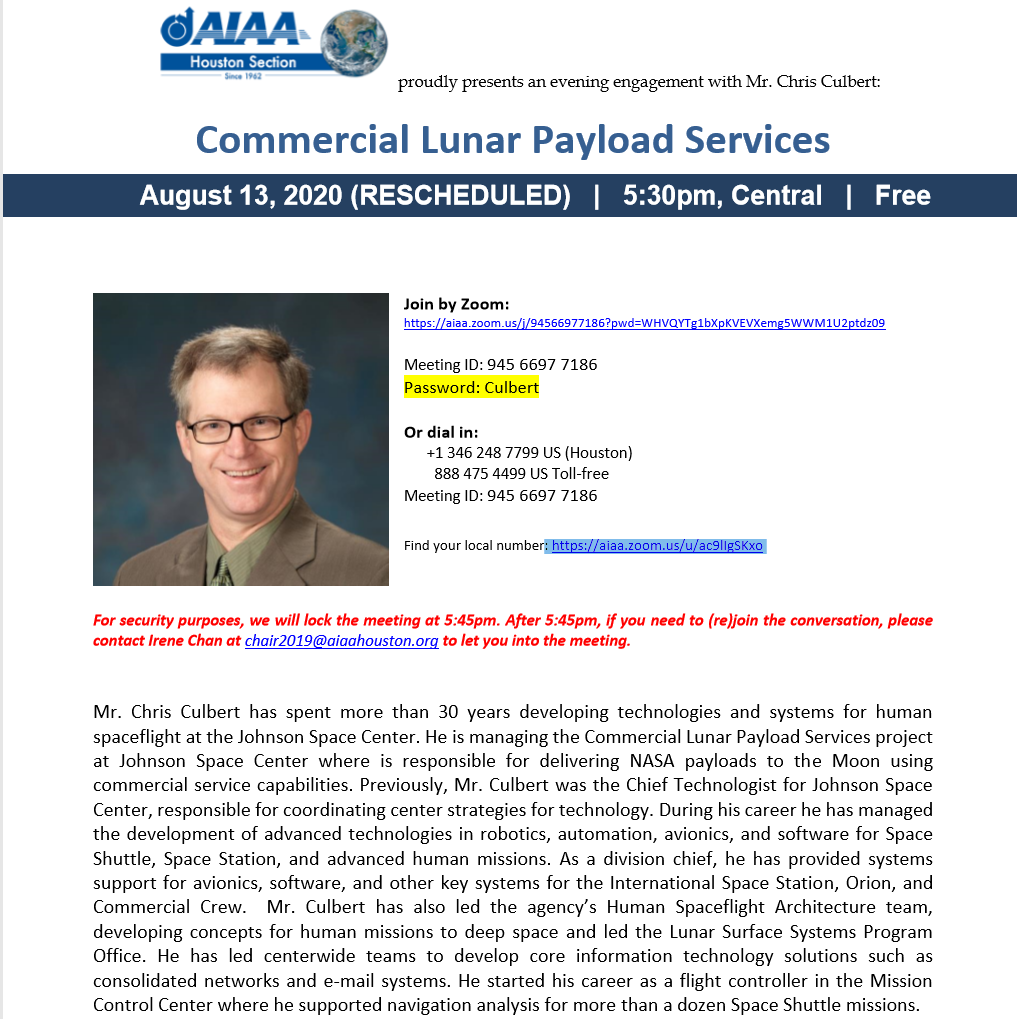Join the AIAA Houston section for a virtual young professionals career panel
10 August 2021 06:00 PM Central Time (US and Canada)
Virtual
To submit audience questions, please follow this link.

Event page contains more details. See you there!


Event page contains more details. See you there!

Dr. Melamed is a project leader in the Embedded Control Systems Department in the Guidance and Control Subdivision at The Aerospace Corporation. He joined Aerospace in 2003. As a technical lead in Launch Vehicle Software, Melamed coordinates and guides a team of interdepartmental technical experts, and supports validation and mission readiness certification of the flight software and mission parameters for NASA’s Artemis missions. He conducts planetary defense technical and policy studies, co-chairs planetary defense conferences, serves on exercises exercise organizing committees, and speaks at these venues. He earned a Ph.D. in Aerospace Engineering from Georgia Tech.
Given this reality: What are the current risks? How would we deflect or destroy an asteroid or comet on a collision course with Earth? What are the technical and political risks? What are the obligations and strategic interests that would drive a decision to act? This talk describes results from recent international planetary defense conferences and table-top exercises addressing these global questions through scientific studies and hypothetical scenarios. The talk also highlights evolving public and educational outreach, new simulation tools, recent space missions, and actions taken by the United Nations to support Planetary Defense.
Please join Dr. Michael Martin as he discusses his aerospace career as a former rocket engine tester, a senior design engineer on Orion, and a rocket propulsion researcher.
When:
Thursday, March 11 @ 7:00 PM Central Time (US and Canada)
Join via Zoom Meeting
Meeting ID: 956 3552 9546
Passcode: 969540
Dial by your location
+1 346 248 7799 US (Houston)
+1 253 215 8782 US (Tacoma)
+1 669 900 6833 US (San Jose)
+1 312 626 6799 US (Chicago)
+1 929 436 2866 US (New York)
+1 301 715 8592 US (Washington DC)
877 853 5247 US Toll-free
888 788 0099 US Toll-free
Meeting ID: 956 3552 9546
Find your local number
Join by H.323
162.255.37.11 (US West)
162.255.36.11 (US East)
115.114.131.7 (India Mumbai)
115.114.115.7 (India Hyderabad)
213.19.144.110 (Amsterdam Netherlands)
213.244.140.110 (Germany)
103.122.166.55 (Australia Sydney)
103.122.167.55 (Australia Melbourne)
149.137.40.110 (Singapore)
64.211.144.160 (Brazil)
69.174.57.160 (Canada Toronto)
65.39.152.160 (Canada Vancouver)
207.226.132.110 (Japan Tokyo)
149.137.24.110 (Japan Osaka)
Meeting ID: 956 3552 9546
Passcode: 969540
Experience keynote speakers and grow your network from the comfort of your own home. Connect online for the 2020 Annual Technical Symposium being held virtually for the first time ever!
Register here
This FREE event will take place on Oct 24, 2020 08:00 AM in Central Time (US and Canada)
ATS is open to the public. AIAA membership not required.
Monday, October 19, 2020 – Authors to be notified of abstract acceptance.
For more information, visit the 2020 ATS page.
When: 5:30 pm, Central
Cost: Free
Join by Zoom: https://aiaa.zoom.us/j/94566977186?pwd=WHVQYTg1bXpKVEVXemg5WWM1U2ptdz09
Meeting ID: 945 6697 7186
Password: Culbert
Or dial in: +1 346 248 7799 US (Houston) 888 475 4499 US Toll-free Meeting ID: 945 6697 7186
Find your local number: https://aiaa.zoom.us/u/ac9lIgSKxo
